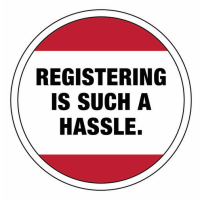Activists Say They Will Sue California for Motor Voter Registration Failure

Voting-rights advocates accused California’s Department of Motor Vehicles (DMV) Thursday of violating the federal “Motor Voter” law by not facilitating voter registration during its licensing of drivers.
The complaint was outlined in an eight-page letter of non-compliance (pdf), as a precursor to filing a lawsuit. The two-decade old law requires states to simplify the process of voter registration by coordinating it with the issuance of IDs and driver’s licenses.
The letter, signed by lawyers for the American Civil Liberties Union (ACLU), Project Vote, Demos and Morrison Foerster LLP, said the DMV still doesn’t do that.
“California does not treat the driver’s license application as a voter registration application—instead it makes voters complete an entirely separate voter registration application,” Demos lawyer Stuart Naifeh told KQED.
The complaint alleged that voter registration and licensing are not done simultaneously at application or renewal, resulting in duplicative work by the voter. The DMV fails to automatically update an address for purposes of voting when a change of address is submitted. Voter registrations are cancelled when a change of address is submitted to a new county.
The last bullet-point in the letter seemed kind of all-encompassing. The department fails “to properly transmit voter registration applications and changes of address from the DMV to election officials.”
The complaint was submitted to Secretary of State Alex Padilla on behalf of the League of Women Voters, ACCE Institute, California Common Cause, the National Council of La Raza and others.
The complaint quoted liberally from the National Voter Registration Act of 1993, as it’s formally known.
Section 5 states that DMV license and renewal applications “shall serve as an application for voter registration . . . unless the applicant fails to sign the voter registration application.” Voter registration “may not require any information that duplicates information required in the driver's license portion of the form.” And if a voter is already registered, updating any licensing or ID information “update[s] any previous voter registration by the applicant.”
The complaint was filed on the same day that Demos published a report that rated how well the states were complying with the law. The reviews were mixed and not all that satisfying. “Despite the popularity of this mode of voter registration, the ‘Motor Voter’ provision is not performing up to its potential, and, in many states, implementation of the statute’s requirements is severely wanting,” it said.
California was one of the laggards. Only five states had a worse record of voter registration during driver’s license transactions. Although the report covers all 50 states, California came in for special criticism:
“The field investigation also provided confirmation of what we expected the effect of California’s practices to be: Most individuals applying for a driver’s license did not complete the voter registration application while at the DMV, even when they responded “yes” to the voter registration question on the driver’s license application form.”
–Ken Broder
To Learn More:
ACLU: California DMV Fails at Voter Registration; Lawsuit Possible (by Marisa Lagos, KQED)
California Violates Motor Voter Act, Activists Say; Lawsuit Threatened (by Patrick McGreevy, Los Angeles Times)
Voting Rights Groups Move to Enforce “Motor Voter” in California (Project Vote)
The National Voter Registration Act of 1993 (U.S. Department of Justice)
Driving the Vote: Are States Complying with the Motor Voter Requirements of the National Voter Registration Act? (by Stuart Naifeh, Demos)
- Top Stories
- Controversies
- Where is the Money Going?
- California and the Nation
- Appointments and Resignations
- Unusual News
- Latest News
- California Forbids U.S. Immigration Agents from Pretending to be Police
- California Lawmakers Urged to Strip “Self-Dealing” Tax Board of Its Duties
- Big Oil’s Grip on California
- Santa Cruz Police See Homeland Security Betrayal in Use of Gang Roundup as Cover for Immigration Raid
- Oil Companies Face Deadline to Stop Polluting California Groundwater




